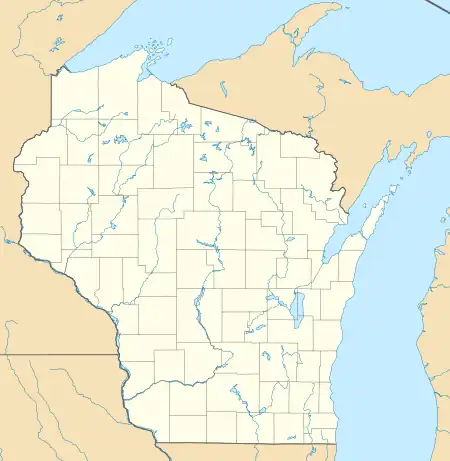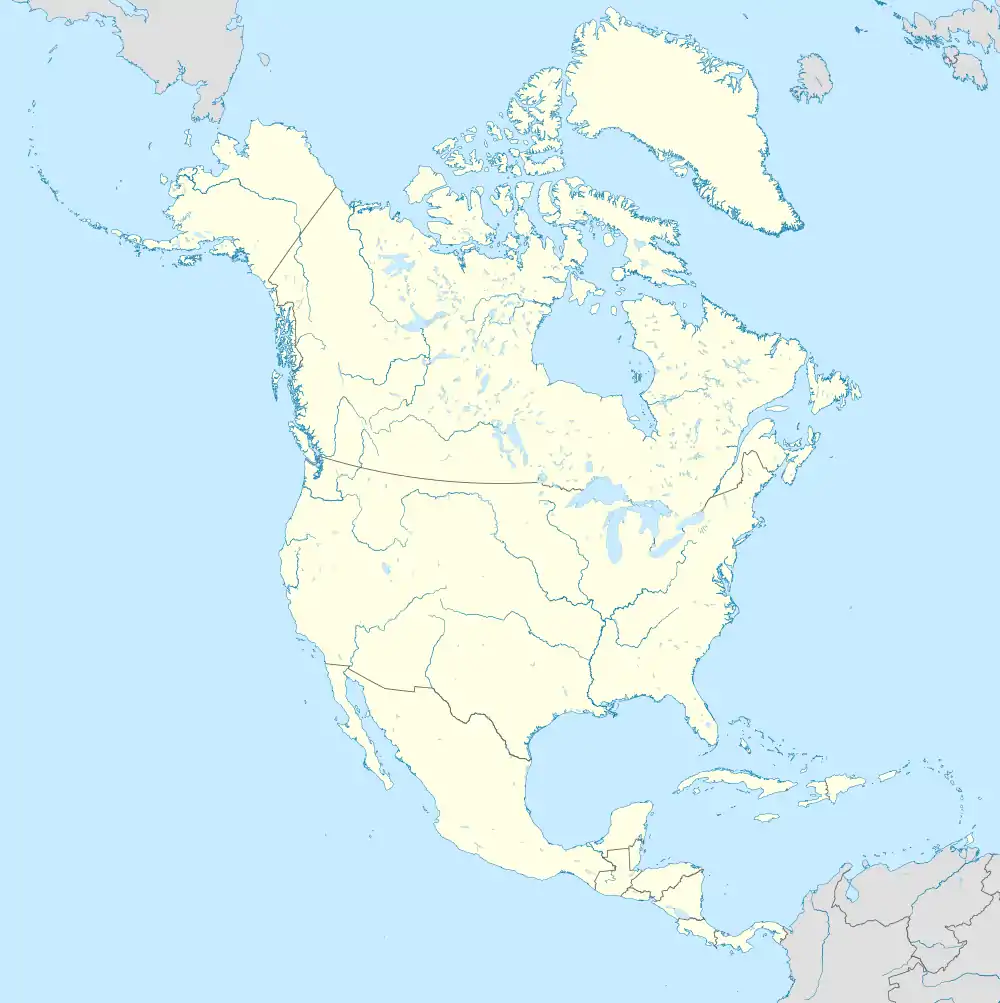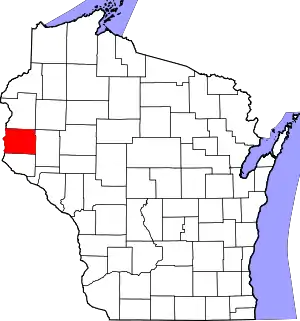Baldwin, Wisconsin | |
|---|---|
 Downtown Baldwin on US63 | |
| Nickname: "The Biggest Little Town in Wisconsin" [1] | |
 Location of Baldwin in St. Croix County, Wisconsin. | |
 Baldwin Location in Wisconsin  Baldwin Baldwin (the United States)  Baldwin Baldwin (North America) | |
| Coordinates: 44°59′51″N 92°19′44″W / 44.99750°N 92.32889°W | |
| Country | |
| State | |
| County | St. Croix |
| Area | |
| • Total | 3.09 sq mi (8.00 km2) |
| • Land | 3.09 sq mi (8.00 km2) |
| • Water | 0.00 sq mi (0.00 km2) |
| Elevation | 1,224 ft (373 m) |
| Population | |
| • Total | 3,957 |
| • Estimate (2019)[5] | 4,072 |
| • Density | 1,317.80/sq mi (508.74/km2) |
| Time zone | UTC-6 (Central (CST)) |
| • Summer (DST) | UTC-5 (CDT) |
| Area codes | 715 & 534 |
| FIPS code | 55-04425[6] |
| GNIS feature ID | 1582743[3] |
| Website | www |
Baldwin is a village in St. Croix County, Wisconsin, United States. The population was 3,957 at the 2010 census, a growth rate of 48% from 2000. The village is adjacent to the Town of Baldwin.
History

Dana Reed Bailey founded Baldwin in 1871. First known as "Clarksville" after its railroad depot, it was renamed Baldwin after the manager of the Western Wisconsin Railroad, D. A. Baldwin, who was responsible for the railroad through the town.[7][8]
Geography
Baldwin is located at 44°57′51″N 92°22′23″W / 44.96417°N 92.37306°W (44.964401, -92.373251).[9]
It is 48 miles (77 km) east of Minneapolis, Minnesota, and 49 miles (79 km) west of Eau Claire, Wisconsin.
According to the United States Census Bureau, the village has an area of 2.91 square miles (7.54 km2), all land.[10]
Demographics
| Census | Pop. | Note | %± |
|---|---|---|---|
| 1880 | 591 | — | |
| 1890 | 482 | −18.4% | |
| 1900 | 631 | 30.9% | |
| 1910 | 584 | −7.4% | |
| 1920 | 666 | 14.0% | |
| 1930 | 808 | 21.3% | |
| 1940 | 918 | 13.6% | |
| 1950 | 1,100 | 19.8% | |
| 1960 | 1,184 | 7.6% | |
| 1970 | 1,399 | 18.2% | |
| 1980 | 1,620 | 15.8% | |
| 1990 | 2,022 | 24.8% | |
| 2000 | 2,667 | 31.9% | |
| 2010 | 3,957 | 48.4% | |
| 2019 (est.) | 4,072 | [5] | 2.9% |
| U.S. Decennial Census[11] | |||
2010 census
At the 2010 census Baldwin had 3,957 people, 1,572 households, and 1,006 families. The population density was 1,359.8 inhabitants per square mile (525.0/km2). It contained 1,724 housing units at an average density of 592.4 per square mile (228.7/km2). The racial makup of the village was 96.0% White, 0.9% African American, 0.4% Native American, 0.6% Asian, 0.6% from other races, and 1.6% from two or more races. Hispanic or Latino of any race were 1.6%.[4]
Of the 1,572 households 37.0% had children under the age of 18, 51.7% were married couples living together, 7.8% had a female householder with no husband present, 4.5% had a male householder with no wife present, and 36.0% were non-families. 28.9% of households were one person and 12.1% were one person aged 65 or older. The average household size was 2.48 and the average family size was 3.09.
The age distribution was 24.1% under the age of 18, 10.0% from 18 to 24, 29.0% from 25 to 44, 18.0% from 45 to 64, and 18.9% 65 or older. The median age was 35 years. The female:male ratio was 100:90.9. For every 100 females age 18 and over, the village had 89.3 males.
The median household income was $40,313 and the median family income was $51,250. Males had a median income of $37,216 versus $26,250 for females. The per capita income for the village was $20,748. About 3.0% of families and 5.5% of the population were below the poverty line, including 3.0% of those under age 18 and 5.6% of those age 65 or over.
Education

There are three public schools in the Baldwin Woodville School District. Greenfield Elementary School and Baldwin-Woodville High School are in Baldwin, and Viking Middle School is in Woodville.
Notable people
- Hans A. Aune, Wisconsin state representative, businessman, and educator, born in Baldwin[12]
- Raymond A. Peabody, Wisconsin state representative and businessman, born in Baldwin[13]
- James Patrick Powers, Roman Catholic bishop of the Diocese of Superior, born in Baldwin[14]
See also
References
- ↑ "Baldwin, Wisconsin - The Biggest Little Town in Wisconsin". Village of Baldwin. 2009. Archived from the original on January 1, 2010. Retrieved September 4, 2009.
- ↑ "2019 U.S. Gazetteer Files". United States Census Bureau. Retrieved August 7, 2020.
- 1 2 "US Board on Geographic Names". United States Geological Survey. October 25, 2007. Retrieved January 31, 2008.
- 1 2 "U.S. Census website". United States Census Bureau. Retrieved November 18, 2012.
- 1 2 "Population and Housing Unit Estimates". United States Census Bureau. May 24, 2020. Retrieved May 27, 2020.
- ↑ "U.S. Census website". United States Census Bureau. Retrieved January 31, 2008.
- ↑ "Baldwin, Wisconsin: Table of Contents". Village of Baldwin. 2009. Archived from the original on February 4, 2011. Retrieved March 1, 2010.
- ↑ Chicago and North Western Railway Company (1908). A History of the Origin of the Place Names Connected with the Chicago & North Western and Chicago, St. Paul, Minneapolis & Omaha Railways. p. 167.
- ↑ "US Gazetteer files: 2010, 2000, and 1990". United States Census Bureau. February 12, 2011. Retrieved April 23, 2011.
- ↑ "US Gazetteer files 2010". United States Census Bureau. Archived from the original on January 25, 2012. Retrieved November 18, 2012.
- ↑ "Census of Population and Housing". Census.gov. Retrieved June 4, 2015.
- ↑ 'Wisconsin Blue Book 1931,' Biographical Sketch of Hans A. Aune, pg. 241
- ↑ 'Wisconsin Blue Book 1956,' Biographical Sketch of Raymond A. Peabody, pg. 37
- ↑ Vatican names new Bishop for Diocese of Superior
External links
- Official website
- Baldwin Bulletin
- Baldwin Woodville Chamber of Commerce
- Sanborn fire insurance maps: 1902 1912
